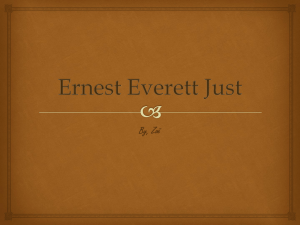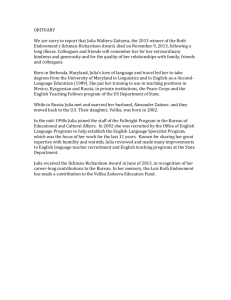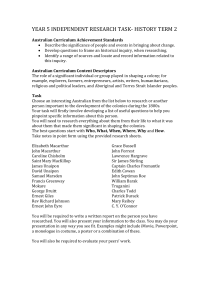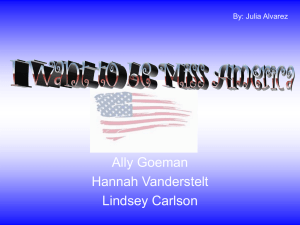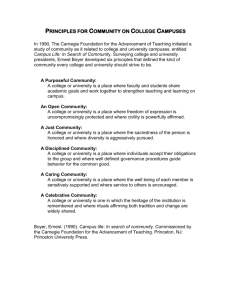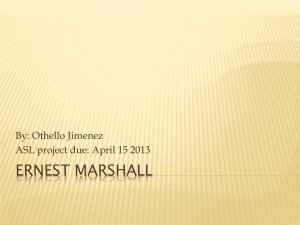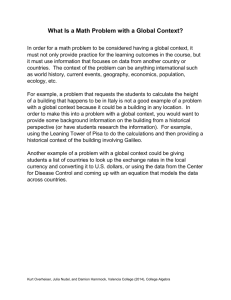Ch01-Outline
advertisement
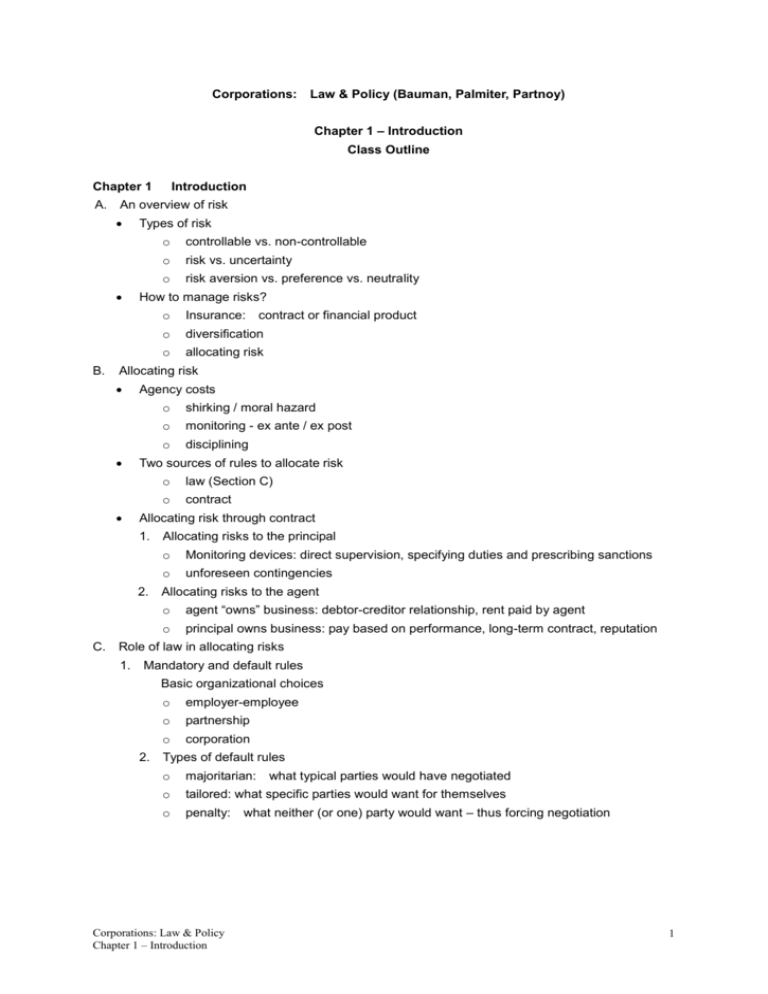
Corporations: Law & Policy (Bauman, Palmiter, Partnoy) Chapter 1 – Introduction Class Outline Chapter 1 A. An overview of risk B. Types of risk o controllable vs. non-controllable o risk vs. uncertainty o risk aversion vs. preference vs. neutrality How to manage risks? o Insurance: o diversification o allocating risk contract or financial product Allocating risk Agency costs o shirking / moral hazard o monitoring - ex ante / ex post o disciplining Two sources of rules to allocate risk o law (Section C) o contract Allocating risk through contract 1. 2. C. Introduction Allocating risks to the principal o Monitoring devices: direct supervision, specifying duties and prescribing sanctions o unforeseen contingencies Allocating risks to the agent o agent “owns” business: debtor-creditor relationship, rent paid by agent o principal owns business: pay based on performance, long-term contract, reputation Role of law in allocating risks 1. Mandatory and default rules Basic organizational choices 2. o employer-employee o partnership o corporation Types of default rules o majoritarian: o tailored: what specific parties would want for themselves o penalty: Corporations: Law & Policy Chapter 1 – Introduction what typical parties would have negotiated what neither (or one) party would want – thus forcing negotiation 1 Chapter 1 Introduction Class Notes A. An Overview of Risk Problem: Winemaking Julia owns a vineyard, but she's not an outdoors type and wants help. Ernest knows grapes, but he doesn't have a vineyard. They both want to make money. How might the two get together? What will be the issues they must confront? Julia hires Ernest Ernest leases from Julia What are the risks they face? Can Julia and Ernest avoid these risks? Who is in a better external v. internal position to bear non-controllable risks? Controllable risks? diversifiable v. Will Julia want to allocate risks to Ernest - he bears all risks non-diversifiable and leases vineyard from her? Why might Ernest not want Are risks bad? this? What is "risk profile"? Which would you prefer - a 50/50 chance of flipping a coin risk aversion vs. risk and making $200 or nothing, or a certain reward of preference $80? What is the expected return of the coin flip? Do things Why do capitalists tend to be change if I say a coin flip for $200,000 vs. $80,000 more risk preferring? guaranteed? What relevance does this have to Julia and Ernest? B. Allocating Risk What is gained by specialization? capital vs. labor informational advantages firm-specific capital What is the allocation of risk if Julia hires Ernest? If Ernest leases from Julia? Can Julia ever allocate all risks to Ernest? If Julia takes some risks, what methods will she use to minimize them? Does diversification reduce risk? Why is capital easier to If Julia owns other vineyards, will that affect whether she worries about Ernest's shirking or disloyalty? diversify than labor? Why is a diversified investor Will she want to take greater or smaller risks if she is more risk-preferring? diversified? How will she accomplish this? What are agency costs? Corporations: Law & Policy Chapter 1 – Introduction If Julia hires Ernest, what should she worry about? How 2 monitoring efforts might she minimize her worries? Will Ernest have any disciplining efforts incentive to help assuage her fears? shirking costs / moral hazard If Ernest leases from Julia, what should she worry about? Are her worries different when he owns the business, not she? How might she reduce her risks? How can agency costs be reduced? C. What are the differences between ex post and ex ante ex ante and ex post monitoring devices? contracting vs. legal What do you think would work best for you, if you were in constraints Ernest's position? profit sharing reputational stake The Role of Law in Allocating Risks Role of law - employment rules Suppose Julia hires Ernest. Consider the implications under various legal rules and the role of law in business organizations: Rule 1: What kind of rule is Rule 1 - minimum wage law? Why do law-makers (legislatures and courts) create such rules? Every employer shall pay to each of Can Julia and Ernest agree as follows: his employees wages at not less than $ 10 an hour. "Compensation will be at $3.50/ hour. Employee understands that employer would not hire her otherwise." Is there any way for them to avoid the minimum-wage law? Rule 2: What kind of rule is Rule 2 - employment at-will? How do you know what kind of rule it is? What are the advantages An employment, having no specified of such a rule? What are the disadvantages of such a term, may be terminated at the will rule? Would most employers and employees have agreed of either party on notice to the other. to this rule? Even if most parties to employment relationships would not have agreed to this, is it the most Corporations: Law & Policy Chapter 1 – Introduction 3 efficient rule? When is it appropriate for law-makers (legislatures and judges) to create such rules? Julia and Ernest sign the following. Is it binding? "Employee shall have a term of employment of one year. If Employer discharges Employee, except for cause, Employer is liable to pay Employee a severance payment equal to $60,000 less any monthly salaries already paid during the term of this agreement." Or perhaps Ernest signs the following: "I solemnly promise to give my employer thirty (30) days notice before terminating employment. My employer can, of course, terminate my employment at any time, with or without prior notice." Rule 3: What kind of rule is Rule 3? Who decides what are An agent enters into a fiduciary “reasonable efforts” and whether information is “relevant to relationship with a principal the affairs entrusted him”? requiring that an agent exercise reasonable diligence. Specifically, Ernest proposes a contractual stipulation: an agent is subject to a duty to use reasonable efforts to give his “I am not bound to provide you information if I receive a principal information relevant to job offer from another vineyard owner.” affairs entrusted to him and which, as the agent has notice, the principal would desire to have. Rule 4: What kind of rule is Rule 4? Would an employer ever want this rule? Although an employee cannot compete with his employer during Julia tells Ernest she will not hire him unless he agrees to the the term of employment, a following: non-compete covenant will not be implied after the employment “I will not seek or accept employment as vineyard terminates. manager for 2 years after my employment with you ends with any other vineyard owner in Napa Valley.” Corporations: Law & Policy Chapter 1 – Introduction 4 Majoritarian - EFFICIENT rule what most parties would Tailored - REASONABLE rule have chosen specific, bright-line avoids ex ante negotiation, ex post litigation Corporations: Law & Policy Chapter 1 – Introduction would have chosen standards what the actual parties Penalty - TERRIBLE rule open-ended standards not have chosen for judges reduces ex ante negotiation cost what the parties would rule penalizes party with bargaining power forces negotiation; avoids ex post interpretation 5
